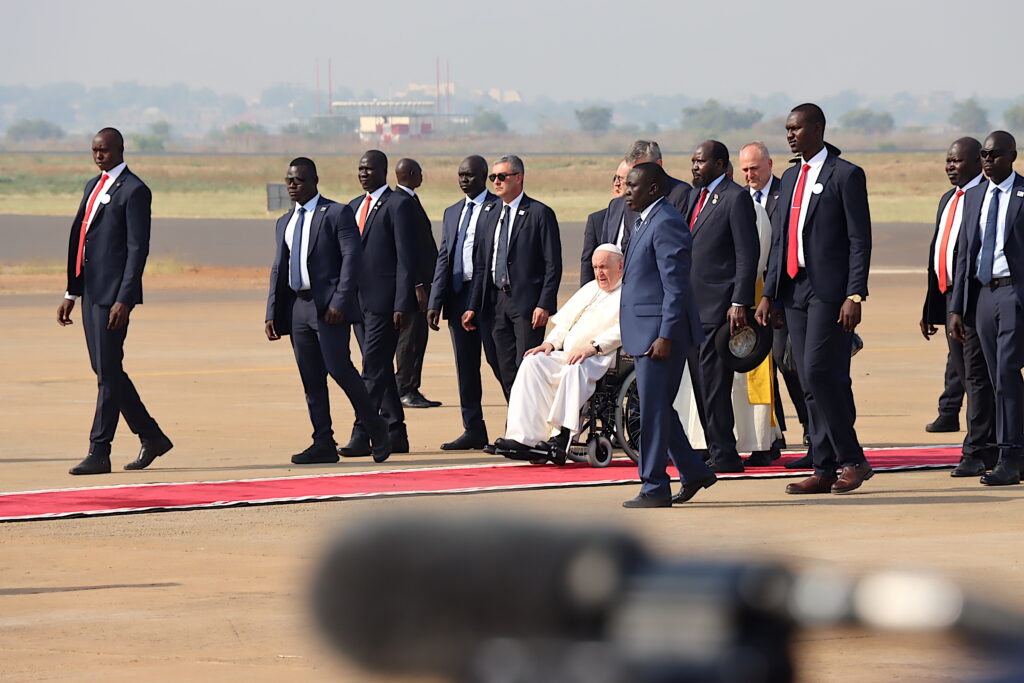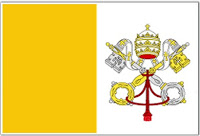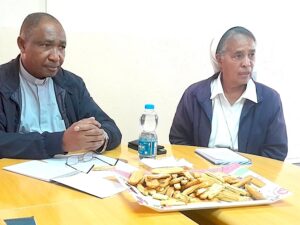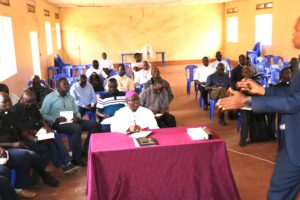PAPAL VISIT SOUTH SUDAN: On First Ecumenical Pilgrimage Day, Church Leaders Make Strong Appeal for Unity and Peace to South Sudan Leadership

Andrew Kaufa smm
Addressing the leadership, diplomats and civil society in South Sudan, the three religious leaders who are on ecumenical pilgrimage for peace, Pope Francis of the Catholic Church, the Archbishop of Canterbury for the Anglican Church and the Moderator of the General Assembly of the Church of Scotland for peace to the country, have appealed to the political leaders of the country to ensure posterity through peace making.
In his address, Pope Francis made reference to the River Nile which makes South Sudan and all the countries it passes through until Egypt as a gift which makes their land to be of great abundance so much that even the explorers in history ventured into the region in search for the resources that are along it. On this note, he reminded them that posterity can only be realized if they work for renewal of their social life.
“You, distinguished leaders, are these springs: the springs that water the life of the community, the fathers and mothers of this young country. You are called to renew the life of society as pure sources of prosperity and peace, so greatly needed for the sons and daughters of South Sudan. They need fathers, not overlords; they need steady steps towards development, not constant collapses,” said Pope Francis in reference to the 2018 Revitalized Agreement on the Resolution of the Conflict in the Republic of South Sudan (R-ARCSS) whose implementation is facing is yet to be realized to the full.
Pope Francis went on to remind the leadership of South Sudan that democracy is essential for the country to take the desired course of peace and that such as system of government democracy “presupposes respect for human rights, upheld by law and the application of law, particularly the right to freedom of expression”, a point made by Pope Saint John Paul II in his January 1, 2002 message for the World Day of Peace.
“Mr. President, distinguished authorities, in tracing the River Nile, I wanted to venture along the path of this country as young at it is beloved. I realize that some of what I have had to say may appear blunt and direct, but please know that this arises only from the affection and concern with which I follow the life of your country, together with my brothers with whom I have come,” concluded Pope Francis as he prayed for reconciliation, peace and prosperity of the country.
Taking his turn, the Archbishop of Canterbury Most Rev. Justin Welby reference Jesus’ prayer in John 17 “that they may all be one” as he reminded the leadership of South Sudan about their 2019 encounter in Rome where Pope Francis kissed their feet and added that their coming is “to encourage the church’s remarkable work in building peace”, “to listen to the young people and tell them about their hopes for peace and opportunity” and “to honour the women who have known such terrible suffering and yet have been the sing of the resurrected life.”
“I pray that this may be a visit of great hope and healing, of time spent together as one church family, following the one God who brings us ever closer to each other and to him,” concluded Archbishop Welby.
And on his part, the Moderator of the General Assembly of the Church of Scotland Rev. Lain Greenshield also made reference to Jesus’ prayer on John 17 as he insisted that the three leaders have come to South Sudan “in humility, unity and love as servants of Christ “to seek and share their hope that all will be one in Him.”
“Today we need that peace. We need church leaders who are generous of heart, liberal of love and profligate with God’s grace. We need leaders who care about the values by which our countries live, who care about the conditions in which people live, and who act out of their faith in work amongst the most vulnerable and marginalized,” said Rev. Greenshield as he appealed to the political leadership of the country to unite as co-workers “in God’s desire for a world in which people can live life in fullness.”


